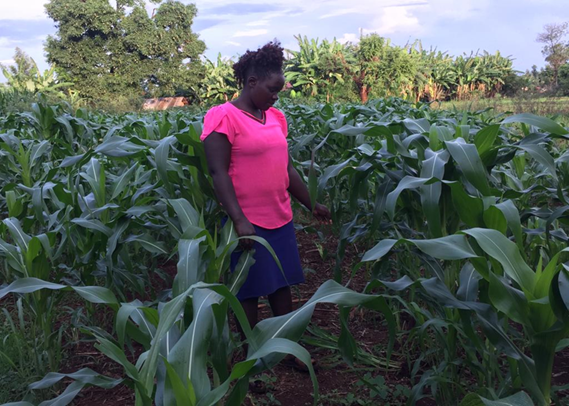Sustainable Development Goals 2 – Eradicating Hunger, SDG 17 – Partnering for the Goals

For International Development Week 2024 (February 4-10) The United Church of Canada highlights Mission and Service Partners who are contributing to the Sustainable Development Goals.
My name is Doreen Mwende. I am 23 years old. I am married and have one lovely girl child who is now six. I live with my husband, two sisters-in-law, and my mother-in-law. My husband has just been employed as a teacher in one of the secondary schools in Tharaka, and I am a farmer.
I had my first farm in January 2016; it was almost one acre. I had no idea what farming was in particular. I cleared everything from the land, burnt crop residues to make it clean, and made sure I ploughed my land at the start of every season. My first harvest was terrible—I harvested just one 90 kg bag of cowpeas even after some good rains. I persisted for the next two seasons until I saw my sister-in-law, who had joined National Council of Churches of Kenya (NCCK) training, covering her soil with stalks from the previous harvest and digging some planting basins for planting maize. At the end of the season, the harvest really repaid her work. The following season I started copying from her, and my harvest started improving. I had no idea what I was copying from my sister-in-law was part of conservation agriculture (CA).
In August 2018 the NCCK team visited, and I was chosen for training. I incorporated what I learned, and my harvest became stable. Yields increased from one 90 kg bag to three 270 kg bags. I was able to raise the amount needed to connect my land to irrigation water (80,000 ksh), and this helped me produce even during the off season. In 2020, during COVID, I had my sisters-in-law at home, and I actively involved them in the farm. The harvest was nice and we were able to buy a plot of land. I also bought a cow that has given birth to two calves in the past two years.
I also learned about other activities from NCCK staff, such as kitchen gardening and poultry keeping. During the dry season, I irrigate some crops around my house, like onions, sugarcane, kale, and banana trees. This has continuously provided green and fresh foods for my family. I also started poultry keeping, and I can easily sell chickens to fund my planting, weeding, and pest control.
I feel economically empowered as a woman, as my contributions to the family is felt. My husband now comfortably pays the school fees for my sisters-in-law, since I can feed the family. NCCK has mentored me from a young, shy girl to a big, courageous woman who can now take part in leadership in the community. I now feel that even if the NCCK conservation agriculture project phases out today, I personally would sustain a lot of what I have learned from them.
Learn more about NCCK and their work in conservation agriculture on their website.
What Can You Do to contribute to the Sustainable Development Goals?
- Support United Church programming at the Canadian Foodgrains Bank. Many United Church people and congregations contribute to CFGB by supporting growing projects in their local areas.
- Giveto Mission and Service to help support Canadian and global partners working towards meeting the Sustainable Development Goals.
- Follow United Action for Justice’s Facebook page and the Roundthe Table blog for more information on how your community of faith can learn more, participate, and #goforthegoals!
- Share a prayer for AMeal Time Blessing.